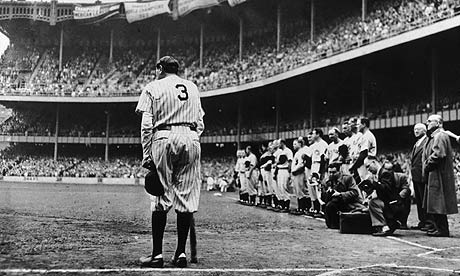
Even though we may have been held to a draw on Saturday, it's a fairly safe bet that England are probably going further in this World Cup than the US. But despite our superiority on the football pitch, when it comes to writing about sports the Americans have us soundly beat.
In his new book, Playing Days, Benjamin Markovits explores how sports have been tightly woven into American fiction since Melville wrote "possibly the best sports novel ever" with Moby-Dick. But American novelists don't necessarily dominate the playing field: scores of journalists, such as Gay Talese, George Plimpton and David Halberstam, have helped create such a rich literary tradition that the PEN American Centre recently established an award honouring the best non-fiction books about sport.
The contrast between our approaches to sports journalism is remarkable. As a recent Radio 4 debate highlighted, Britain has very high standards but also rather boring ones, hemmed in by newspaper conventions and lacking much literary ambition. Sure, you can read entertaining and informative coverage of Wimbledon, but you won't find David Foster Wallace meditating on Roger Federer as religious experience.
And who would we put up against writers such as John McPhee, whose highly literary sports reportage has resulted in several classic books about basketball and tennis, including the brilliant A Sense of Where You Are? John Major's clear-sighted canter through the early history of cricket may have received warm applause, but it didn't exactly quicken the pulse.
So why this difference? It could just be the contrasting nature of British and American sports. Many US games are pure entertainment: points ratchet endlessly upwards, resulting in scores that make British people wonder whether the match accidentally overran by three weeks. The long stretches of gentlemanly inaction that you find in cricket have been engineered out of baseball, while anything as tedious as a 0-0 draw is unheard of in American football. This non-stop euphoria understandably lends itself to the drama and narrative punch on which good sports writing thrives.
But our national dreams also have something to do with why we lag behind. The enduring American fascination with underdogs who hit the big time is found everywhere in its sports writing. You'll see it in classic articles such as Richard Ben Cramer's profile of baseball star Ted Williams and Tom Wolfe's wild story about the rise of southern stock-car hero Junior Johnson – both brilliant pieces of writing whether you like sport or not – and it's been employed by American writers ever since. The thrill of American sports, combined with the possibility that almost anyone could make it, just makes for great storytelling.
If we have anything resembling a literary hope, it comes from football. The only British field sport that has historically been the preserve of the lower classes, the beautiful game has spun out excellent books, such as Gary Imlach's My Father and Other Working-Class Football Heroes, and Hunter Davies, who infiltrated the Spurs dressing room and wrote one of the first books about professional football from the inside, also deserves special mention.
But I can't help feeling that these books don't add up to much of a literary tradition. Which is strange, because football has all the ingredients for great writing. As Adam Gopnik once wrote in a New Yorker essay on the World Cup: "Soccer was not meant to be enjoyed. It was meant to be experienced. The World Cup was a festival of fate – man accepting his hard circumstances, the near certainty of his failure. There is after all, something familiar about a contest in which nobody wins and nobody pots a goal. Nil-nil is the score of life."
With such material to work with, shouldn't we be putting out a stronger team?

